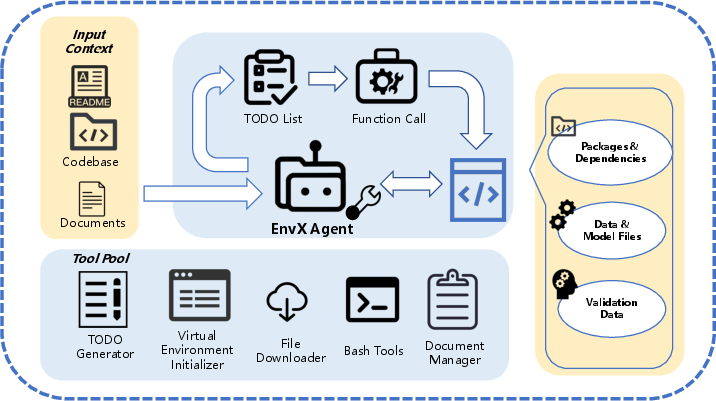- The paper introduces a novel three-phase pipeline that agentizes repositories into interactive agents, drastically reducing manual intervention.
- It implements an A2A protocol for seamless inter-agent communication and demonstrates superior task execution rates on the GitTaskBench benchmark.
- Evaluations reveal that EnvX outperforms existing systems in task pass rate and token efficiency, enabling scalable multi-agent software ecosystems.
EnvX: Agentize Everything with Agentic AI
Introduction
EnvX presents a systematic framework for transforming open-source code repositories into autonomous, interactive agents capable of natural language interaction and multi-agent collaboration. The approach leverages agentic AI to address the inefficiencies and manual overhead inherent in traditional repository utilization, where developers must manually interpret documentation, understand APIs, and write integration code. EnvX reimagines repositories as active agents, enabling direct invocation of repository functionalities and orchestrated collaboration between multiple agents. The framework is evaluated on the GitTaskBench benchmark, demonstrating superior execution completion and task pass rates compared to existing agentic systems.
Agentization Framework and System Architecture
EnvX operationalizes repository agentization through a three-phase pipeline:
- Agentic Environment Setting: The system initializes the computational environment by parsing repository documentation and code to identify dependencies, required datasets, and validation artifacts. This phase employs a TODO-guided mechanism, generating a structured list of initialization tasks that are iteratively refined based on execution feedback.


Figure 1: Phase 1 of EnvX, illustrating the agentic environment setting process for repository agentization.
- Human-Aligned Agentic Automation: EnvX instantiates repository-specific agents that autonomously execute real-world tasks. These agents integrate the initialized environment and repository context, leveraging tool-mediated automation to address user queries in a manner consistent with human operational logic.
- Agentic Communication via A2A Protocol: The framework equips agents with communication capabilities using the Agent-to-Agent (A2A) protocol. This protocol standardizes inter-agent communication through agent cards and skill schemas, enabling coordinated multi-agent workflows and scalable system-level intelligence.
The agentization pipeline is underpinned by a suite of specialized tools, including basic utilities, file and dependency management, TODO management, code knowledge graph construction, and A2A generation modules. These tools abstract heterogeneous repository structures and operationalize agentic behaviors, ensuring robust and efficient agent instantiation.
Empirical Evaluation
EnvX is evaluated on GitTaskBench, comprising 18 repositories across domains such as image processing, speech recognition, document analysis, and video manipulation. The benchmark includes 54 human-validated tasks and employs rigorous metrics:
- Execution Completion Rate (ECR): Measures successful execution and output generation.
- Task Pass Rate (TPR): Assesses output quality against ground truth.
- Token Costs: Quantifies LLM usage efficiency.
EnvX is compared against OpenHands, Aider, and SWE-Agent, using GPT-4o, GPT-4.1, and Claude 3.7 Sonnet as backbone models. The results indicate that EnvX achieves a 74.07% ECR and 51.85% TPR with Claude 3.7 Sonnet, outperforming all baselines. Notably, EnvX demonstrates strong robustness across backbone models and superior efficiency, particularly with larger-parameter LLMs. For instance, EnvX achieves comparable or better performance than OpenHands while consuming an order of magnitude fewer tokens.
Multi-Agent Collaboration: Case Study
A case study illustrates EnvX's capacity for multi-repository collaboration. Multiple repositories are agentized, and their agent cards are synthesized to expose domain-specific skills. A router agent orchestrates the invocation of these agents, enabling complex workflows that integrate functionalities across repositories. This demonstrates the reliability and extensibility of the agentization process, highlighting the potential for scalable, real-world applications.

Figure 2: Repository agents collaborating via the A2A protocol, coordinated by a router agent to solve complex tasks.
Discussion and Limitations
EnvX establishes a paradigm for agentizing heterogeneous repositories and coordinating them via standardized protocols. However, several limitations persist:
- Evaluation is constrained by scripted oracles and curated tasks, limiting coverage for long-horizon coordination and robustness under distribution shift.
- Verification signals for A2A interactions are coarse-grained, impeding automatic synthesis and selection of high-quality agents.
- The framework's cost-quality trade-offs across data, tools, and model backbones require further principled exploration.
Future work should focus on scaling A2A validation, standardizing agent cards and skill schemas, and optimizing cost-quality trade-offs to support safe, reproducible, and efficient agent ecosystems.
Implications and Future Directions
EnvX's agentization methodology has significant implications for software engineering and AI research:
- Practical Impact: Automating repository initialization, task execution, and inter-agent collaboration reduces manual overhead, enhances reliability, and democratizes access to complex software functionalities.
- Theoretical Advancement: The shift from passive code resources to active, communicative agents redefines the abstraction of software components, enabling new forms of compositional intelligence and collaborative problem-solving.
- Scalability: Standardized protocols and tool integration facilitate the construction of large-scale, interoperable agent ecosystems, supporting complex workflows and adaptive behaviors.
Future research should explore richer verification mechanisms, explicit contract-based agent schemas, and principled scaling strategies to maximize the utility and safety of agentic software ecosystems.
Conclusion
EnvX introduces a comprehensive framework for agentizing open-source repositories, enabling autonomous automation and multi-agent communication. The system demonstrates state-of-the-art performance on repository automation benchmarks and showcases robust, efficient agentic workflows. By transforming repositories into intelligent, interactive agents, EnvX lays the foundation for scalable, collaborative software ecosystems and opens new avenues for research in agentic AI and multi-agent systems.


